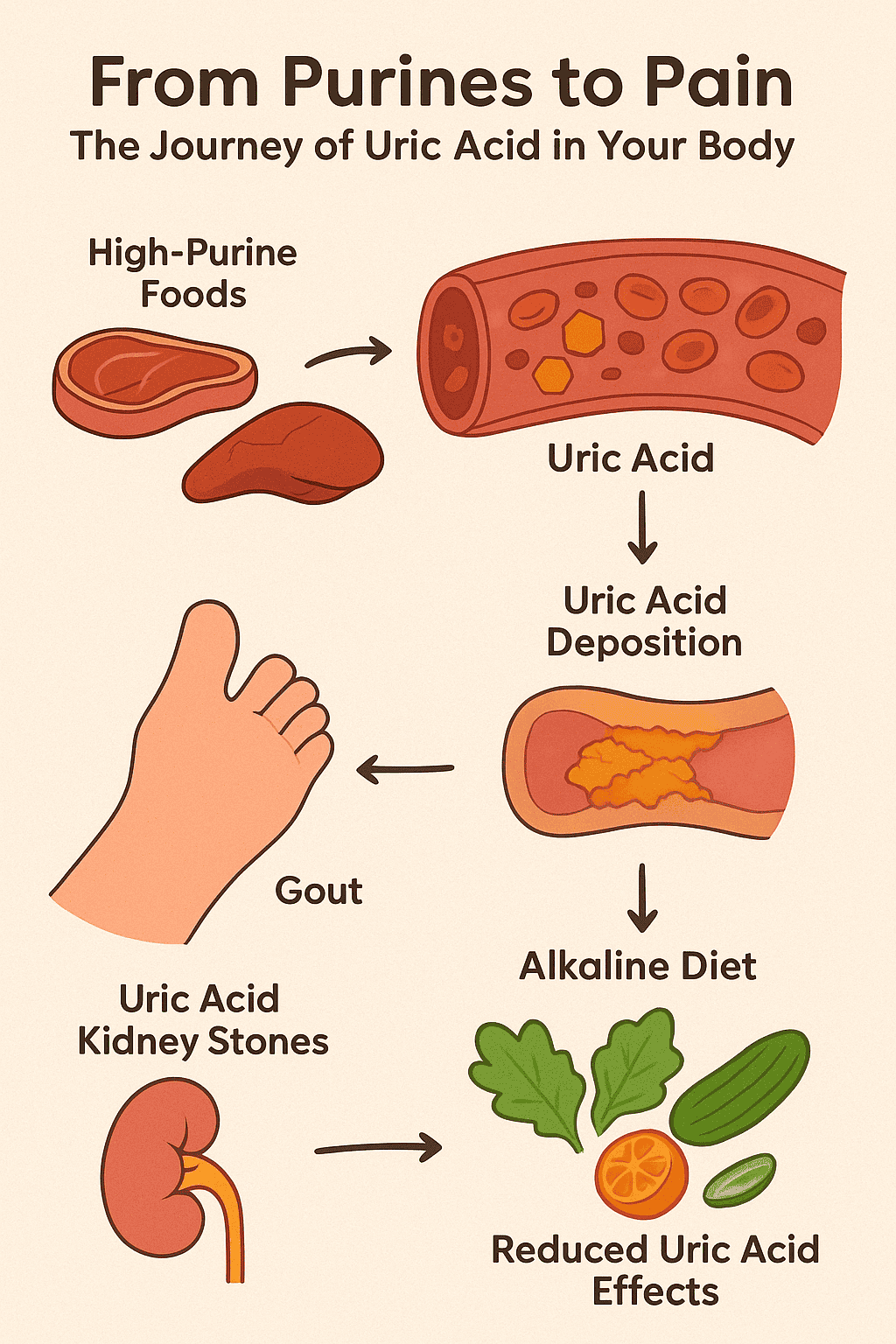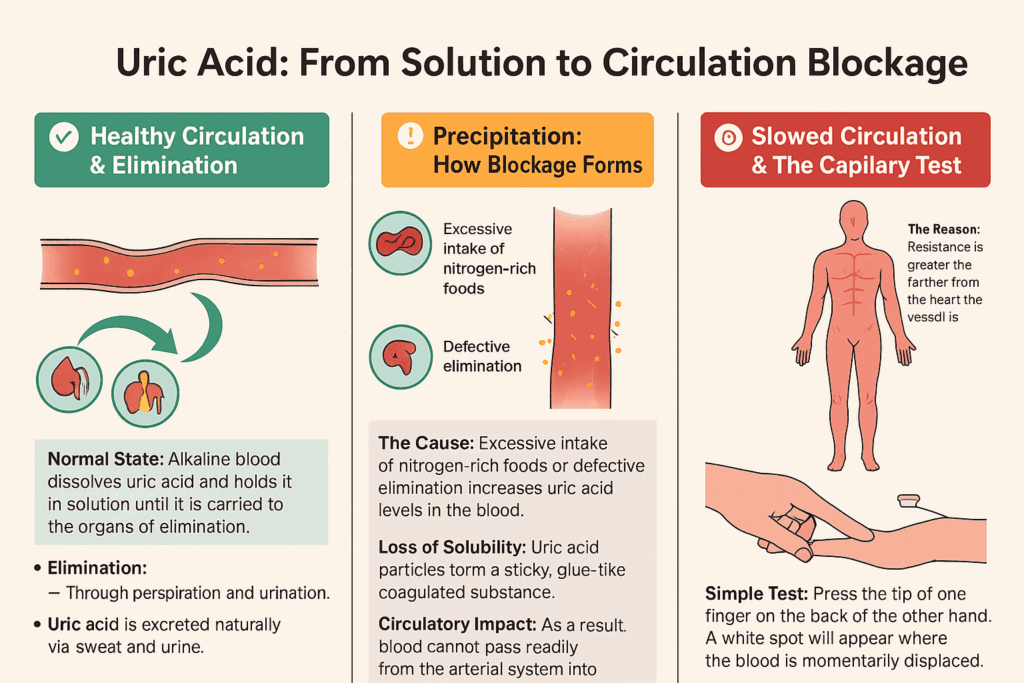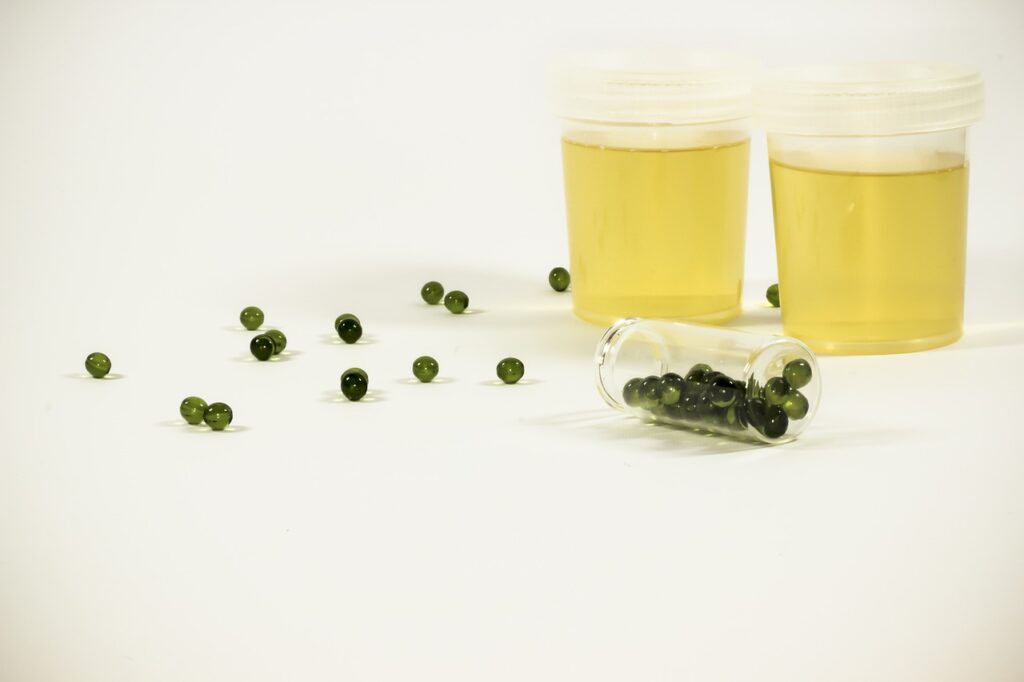Do Acidic Foods Cause Uric Acid Effects? The Real Science Behind Blood Acidity
Have you ever wondered what’s really happening in your body after a rich meal? Beyond calories or fats, a silent process begins—one that can lead to profound uric acid effects throughout your system. First, what is uric acid? Uric acid is a natural waste product formed when your body breaks down purines—compounds found in many foods and even your own cells. Under normal conditions, your kidneys efficiently flush it out, keeping your system balanced and healthy.
But when the body is overloaded with high-purine foods or sluggish elimination, uric acid levels rise. The excess can crystallize into sharp, needle-like structures that lodge in joints, triggering painful gout, or accumulate in the kidneys, threatening kidney health and circulation. Over time, these hidden crystals fuel inflammation and tissue damage.
This guide uncovers the real science behind uric acid’s journey, reveals its silent impact, and shares natural ways to restore balance and protect your vitality

How Uric Acid Is Precipitated: The Mechanism of Uric Acid Deposition
Under healthy, alkaline blood conditions, uric acid remains dissolved and is easily excreted through urine and perspiration. But when the diet is heavy in nitrogenous foods such as animal proteins—or when elimination is defective, uric acid levels rise beyond the blood’s dissolving capacity.

At this point, uric acid begins to crystallize and form a sticky, colloid-like substance. This leads to uric acid deposition—a condition where these microcrystals block tiny blood vessels (capillaries), slowing down circulation. The effect is most noticeable in the extremities, where blood flow pressure is weakest.
Try this simple observation: press your fingertip against the back of your hand. The white spot that lingers momentarily reveals how easily circulation can be obstructed when uric acid deposition thickens the blood. Such blockage not only impairs surface circulation but also stresses the kidneys and tissues, setting the stage for broader uric acid effects like inflammation, gout, and vascular rigidity.
The Kidney Impact: Your Filters Under Siege
Your kidneys are master filters—but they have limits. Continuous uric acid deposition within the renal tubules can lead to micro-scarring and inflammation, known as gouty nephritis. Over time, this cumulative damage can:
- Form uric acid kidney stones that block urine flow and cause severe pain because Crystallized uric acid stones can block urinary tracts, causing excruciating pain and potential infection.
- Lead to chronic kidney disease (CKD) through long-term tissue damage
- Elevate blood pressure, creating a vicious cycle that further harms kidney health
These are the most serious uric acid effects—slow, silent, and systemic.
Beyond the Kidneys: Systemic Inflammation and Disease
Uric acid crystals are not confined to the kidneys. They can deposit anywhere in the body, contributing to:
- Joint inflammation and gout attacks
- Cardiovascular disease, by damaging blood vessel linings
- Metabolic syndrome and insulin resistance
- Chronic low-grade inflammation, which underpins many modern illnesses
Simply put, uric acid deposition transforms a simple metabolic waste product into a systemic disruptor.
High-Uric Acid Foods: The Dietary Culprits
Certain foods are notorious for increasing uric acid effects:
| Food Category | Uric Acid Content | Health Impact |
|---|---|---|
| Organ Meats (Liver, Sweetbreads) | Up to 70.4 grains/lb | Strongly linked to severe uric acid deposition |
| Red Meat (Beef, Veal) | 8–14 grains/lb | Promotes gout and kidney strain |
| Seafood (Anchovies, Sardines, Salmon) | 8+ grains/lb | Elevates blood uric acid and inflammation |
These high-purine foods overload your system with compounds your kidneys must convert and eliminate, leading directly to crystal formation and uric acid deposition in tissues.
The Plant-Based Advantage: Nature’s Uric Acid Solution
In contrast, plant-based foods naturally reduce uric acid effects:
- Legumes & Lentils: Contain minimal purines (~2.5 grains per 1,000 calories)
- Leafy Greens & Vegetables: Negligible uric acid content
- Fruits, Nuts, and Seeds: Naturally alkalizing and low in purines
Moreover, parboiling beans further reduces their purine content, making them a safe and nourishing protein alternative.
Acidic Foods vs. Blood Acidity: A Common Myth Debunked
For decades, many people have believed that eating acidic foods—like citrus fruits, tomatoes, or vinegar—would make the blood more acidic and worsen uric acid effects. This misconception has led countless individuals struggling with gout or kidney stones to avoid some of the healthiest foods available. However, science now paints a very different picture.
Understanding the Body’s pH Balance
Your blood’s pH is tightly regulated within a narrow range of 7.35 to 7.45, meaning it is slightly alkaline. The body’s buffering systems—including the lungs, kidneys, and various minerals constantly work together to maintain this balance.
Even minor deviations in blood pH could be life-threatening, so the idea that eating a lemon or tomato can “acidify” your blood is physiologically impossible.
What does change, however, is the acid-alkaline potential of your urine, which reflects how your body metabolizes foods rather than the foods’ initial acidity. This shift in urine pH is crucial for understanding uric acid deposition and how diet can either encourage or dissolve urate crystals in the body.
Acidic-Tasting Foods Are Not Acid-Forming
Here’s the key distinction: acidic-tasting foods (like citrus, berries, and fermented items) behave very differently once digested. They contain organic acids such as citric, malic, and tartaric acid—compounds that, when metabolized, yield alkaline byproducts like potassium and citrate.
These compounds neutralize excess metabolic acids and promote an internal environment that discourages uric acid deposition in the joints and kidneys.
For example:
- Lemons and Oranges: Though acidic in taste, they leave behind alkaline residues that help dissolve uric acid crystals.
- Apple Cider Vinegar: Rich in acetic acid, it supports digestion and may improve the kidneys’ ability to excrete uric acid.
- Green Vegetables and Leafy Greens: Naturally alkalizing and rich in magnesium, they help maintain a stable pH and minimize harmful uric acid effects.
Acid-Forming Foods
In contrast, acid-forming foods are those that leave an acidic residue after digestion. These are the foods most responsible for uric acid deposition and the cascade of inflammation that follows.
Foods rich in purines and inflammatory compounds can silently intensify uric acid effects and place extra stress on your kidneys. Red and processed meats are especially problematic, as their high purine levels elevate uric acid production in the bloodstream. Likewise, beer and other alcoholic beverages worsen the condition by both increasing uric acid synthesis and reducing its elimination. For a deeper understanding of how alcohol truly impacts your well-being, see our post debunking alcohol myths and health effects.
Additionally, fructose-sweetened drinks, refined sugars, and white flour generate metabolic acids that disrupt your body’s natural pH balance. Even fried and dairy-rich foods contribute to systemic inflammation, compounding these negative effects. These foods not only burden the kidneys but also increase the risk of gout, kidney stones, and other metabolic disorders linked to high uric acid levels. To learn how balancing protein intake supports kidney function and lowers uric acid naturally, explore our detailed guide on the low-protein advantage for uric acid and kidney health.
Why an Alkaline Diet Supports Uric Acid Balance
An alkaline diet—centered on vegetables, fruits, nuts, seeds, and legumes—creates an internal environment that supports kidney function and efficient uric acid elimination. By reducing acid load and providing alkaline minerals like calcium, magnesium, and potassium, this diet helps to:
- Prevent uric acid crystallization in the joints and kidneys
- Reduce systemic inflammation linked to chronic uric acid effects
- Enhance microcirculation, preventing the sluggish blood flow associated with uric acid deposition
Over time, adopting an alkaline diet can restore proper blood and tissue chemistry, aiding the body’s natural ability to eliminate metabolic waste.
The Bottom Line
The idea that acidic foods acidify your blood is one of the most persistent nutritional myths. The truth is that your body’s chemistry is far more sophisticated. Acidic foods are not your enemy—acid-forming diets are. When you fill your plate with alkalizing, plant-based foods, you actively protect yourself from the painful and inflammatory uric acid effects that stem from poor diet and lifestyle.
Your Action Plan: Preventing Uric Acid Effects and Deposition
Take control of your health with these simple, science-backed strategies:
- Reduce High-Purine Foods: Limit organ meats, red meat, and certain seafood, as they are rich in purines that increase uric acid levels and can strain kidney health.
- Embrace a Plant-Forward Diet: Prioritize vegetables, fruits, legumes, and grains for their natural alkalizing and anti-inflammatory benefits. To discover why a plant-centered lifestyle supports long-term wellness and helps lower uric acid naturally, explore our in-depth guide on the benefits of a vegetarian diet for balanced health.
- Stay Hydrated: Proper hydration helps dilute uric acid and promotes efficient kidney filtration. Learn more about how consistent water intake enhances detoxification and supports overall well-being in our post on the benefits of drinking water for kidney and metabolic health.
- Avoid Alcohol & Sugary Drinks: Both can impair uric acid excretion and increase inflammation, heightening the risk of gout and kidney stones.
- Use Alkaline Foods: Incorporate citrus fruits, leafy greens, and cucumbers—they help dissolve uric acid crystals and maintain a balanced internal environment..
Every mindful choice at the dinner table reduces the risk of uric acid deposition and its far-reaching health consequences.

FAQ Section
Do acidic foods increase uric acid levels in the body?
No, acidic foods like citrus fruits or tomatoes do not raise uric acid levels. While they may taste acidic, these foods are metabolized into alkaline compounds that actually help neutralize excess acid in the body. The real culprits behind high uric acid effects are purine-rich and acid-forming foods such as red meat, alcohol, and refined sugars, which increase crystal formation and inflammation.
What foods naturally reduce uric acid and support kidney health?
Foods that promote an alkaline internal environment—like leafy greens, fruits, legumes, and citrus—help dissolve uric acid crystals and support healthy kidney filtration. Staying hydrated and reducing animal protein intake are equally vital. A balanced, plant-forward diet can significantly minimize gout attacks and other uric acid effects over time.
Conclusion: Knowledge Is Power
Understanding uric acid effects and how uric acid deposition develops gives you control over your well-being. By shifting toward alkalizing, plant-based nutrition and limiting purine-heavy foods, you can protect your kidneys, improve circulation, and reduce inflammation.
Your diet isn’t just fuel—it’s medicine. Use it wisely to prevent the silent damage of uric acid buildup and enjoy a healthier, more balanced life.
